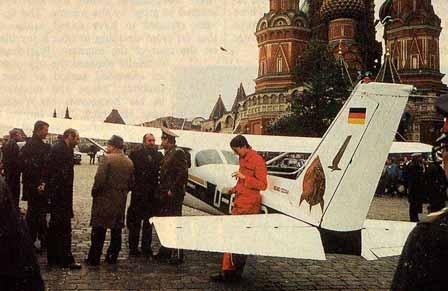Anniversary prompts memories of German teen who landed private plan in Red Square
Mathias Rust flew a small single-engine plane from Finland to the Soviet Union, landing in Red Square. (Photo courtesy of EnglishRussia.com via Wikimedia Commons.)
Twenty-five years ago last week, at the height of the Cold War, a Soviet court sentenced 19-year-old West German Mathias Rust to four years in prison.
His crime — flying a single engine plane into Moscow and taxiing into Red Square — made headlines across the globe.
It all began in May of 1987. Rust was fed up with the Cold War tension between the United States and the Soviet Union. He had a pilot’s license, but little experience. So he hopped into a small, single-engine Cessna airplane, and told his parents he wanted to bank some flying time.
For two weeks, while he flew around Western Europe, a plan was forming.
“I came to the conclusion that I needed to do something that puts an end to this dead end situation,” Rust told the BBC. “I thought I could use this plane to build an imaginary bridge between West and East.”
He spent two weeks psyching himself up in Helsinki, and then took off, telling air traffic control he was going to Stockholm.
Instead, he headed for Moscow, and it wasn’t long before he got the attention of the Soviet Air Force.
“I was approached by a Soviet fighter,” Rust said. “It circled around me two or three times, and then it passed very close on the left. I could see the two pilots, and of course the red star on the wing of the aircraft.”
Rust thought he was a goner. But the Soviet plane left him alone, and he flew on. Each control tower along the way, the story goes, thought he was a local pilot.
Eventually, Rust saw Moscow. At first, he wanted to land in the Kremlin. But then he decided to try to land in Red Square, which was full of people.
So, he landed nearby, and then taxied into Red Square, to the surprise of onlookers.
“I was surrounded by a big crowd of bystanders. Most of them were Russians. And they were standing and smiling at me,” Rust recalled.
They asked Rust who he was, why he was in Moscow, and where he had come from.
“I said I was just here to deliver a peace message to Mikhail Gorbachev, and that I just came from Germany,” he said.
The bystanders smiled, and noted that Germany was a friend of the Soviet Union.
“And I said, ‘no, not East Germany. I’m coming from West Germany,’” he said.
Rust was soon arrested, and convicted of illegally crossing the Soviet border and of “hooliganism.” He was sentenced to four years in prison.
The case caused quite a stir in Russia. For a while, Red Square was jokingly referred to as Moscow’s “third airport.”
But in the Kremlin, heads rolled. Gorbachev dismissed a number of high-ranking military officials — officials who conceivably may have gotten in the way of his glasnost campaign.
“Gorbachev was able to replace important officials with men of his favor. I think my flight to Moscow helped bring both sides closer to each other,” Rust said.
Rust served only a little more than a year of his four-year sentence. He was released in 1988 as a “goodwill gesture” by the Soviet Union.
Rust returned to Germany, where he’s had legal troubles as well, including convictions for fraud and attempted manslaughter.
He now lives in Hamburg and describes himself as a financial analyst and yoga instructor.
We want to hear your feedback so we can keep improving our website, theworld.org. Please fill out this quick survey and let us know your thoughts (your answers will be anonymous). Thanks for your time!
